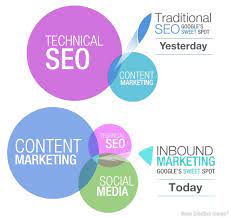The Role of SEO in Content Marketing
Search Engine Optimization (SEO) plays a crucial role in content marketing by ensuring that your valuable content reaches the right audience. In today’s digital landscape, creating high-quality content is only half the battle; the other half is making sure that your content is discoverable by search engines and, ultimately, by users.
Key Benefits of Incorporating SEO into Your Content Marketing Strategy:
- Increased Visibility: By optimising your content for relevant keywords and search terms, you can improve your website’s ranking on search engine results pages (SERPs) and attract more organic traffic.
- Targeted Traffic: SEO helps you target specific audiences based on their search intent, ensuring that your content is seen by users who are actively seeking information related to your products or services.
- Enhanced User Experience: Optimising your content for SEO involves improving factors such as page load speed, mobile-friendliness, and user engagement, which not only pleases search engines but also enhances the overall user experience.
- Measurable Results: Through tools like Google Analytics and Search Console, you can track the performance of your SEO efforts, gain valuable insights into user behaviour, and make data-driven decisions to refine your content strategy.
- Long-Term Success: A well-executed SEO strategy can lead to sustainable organic traffic growth over time, reducing reliance on paid advertising and increasing the authority and credibility of your website.
Best Practices for Integrating SEO into Your Content Marketing Efforts:
- Keyword Research: Identify relevant keywords with high search volume and low competition to target in your content.
- On-Page Optimization: Optimise meta tags, headings, images, and internal links to make it easier for search engines to understand and index your content.
- Quality Content Creation: Focus on creating informative, engaging, and original content that provides value to your audience while incorporating targeted keywords naturally.
- Link Building: Earn high-quality backlinks from reputable websites to boost your site’s authority and credibility in the eyes of search engines.
- User Experience Enhancement: Ensure that your website is user-friendly, mobile-responsive, fast-loading, and offers a seamless browsing experience across devices.
In conclusion, integrating SEO into your content marketing strategy is essential for maximising the reach and impact of your content. By following best practices and staying abreast of algorithm updates and industry trends, you can create a strong foundation for long-term success in the competitive digital landscape.
7 Essential SEO Tips for Effective Content Marketing
- 1. Conduct keyword research to identify relevant and high-traffic keywords for your content.
- 2. Create high-quality and engaging content that provides value to your target audience.
- 3. Optimise on-page elements such as title tags, meta descriptions, and headers with targeted keywords.
- 4. Utilise internal linking to improve website navigation and distribute link equity throughout your site.
- 5. Earn backlinks from reputable websites to increase your site’s authority and credibility.
- 6. Monitor performance using analytics tools to track key metrics like traffic, engagement, and conversions.
- 7. Regularly update and refresh existing content to keep it relevant and maintain its search visibility.
1. Conduct keyword research to identify relevant and high-traffic keywords for your content.
Conducting thorough keyword research is a fundamental step in effective SEO for content marketing. By identifying relevant and high-traffic keywords specific to your industry or niche, you can optimise your content to align with what users are actively searching for. This strategic approach not only helps improve your website’s visibility on search engine results pages but also ensures that your content resonates with the target audience, driving organic traffic and enhancing overall engagement.
2. Create high-quality and engaging content that provides value to your target audience.
Creating high-quality and engaging content that offers genuine value to your target audience is a fundamental tip in SEO for content marketing. By focusing on producing informative and compelling material that resonates with your audience’s needs and interests, you not only enhance user experience but also increase the likelihood of attracting organic traffic. Quality content not only helps establish your authority in your industry but also encourages user engagement, ultimately leading to improved search engine visibility and better overall performance of your website.
3. Optimise on-page elements such as title tags, meta descriptions, and headers with targeted keywords.
To enhance the visibility and relevance of your content to search engines, it is crucial to optimise on-page elements effectively. This includes strategically incorporating targeted keywords into essential elements like title tags, meta descriptions, and headers. By aligning these elements with relevant keywords that reflect user search intent, you can improve the chances of your content being ranked higher in search engine results pages (SERPs) and attract more organic traffic to your website. This meticulous attention to on-page SEO details can significantly impact the discoverability and performance of your content marketing efforts.
4. Utilise internal linking to improve website navigation and distribute link equity throughout your site.
Utilising internal linking in your content marketing strategy is a valuable SEO tip that can enhance website navigation and distribute link equity effectively across your site. By strategically linking relevant pages within your website, you not only make it easier for users to explore related content but also help search engines understand the hierarchy and importance of various pages. This practice can boost the overall user experience, increase the time users spend on your site, and contribute to improved search engine rankings by spreading link authority to key pages.
5. Earn backlinks from reputable websites to increase your site’s authority and credibility.
Earning backlinks from reputable websites is a crucial strategy in SEO for content marketing. These inbound links act as signals of trust and endorsement from established sources, ultimately boosting your site’s authority and credibility in the eyes of search engines. By securing backlinks from high-quality websites within your industry or niche, you not only enhance your site’s visibility but also improve its chances of ranking higher in search engine results pages. This practice not only validates the relevance and value of your content but also strengthens your website’s overall reputation, making it a more trusted resource for both users and search engines alike.
6. Monitor performance using analytics tools to track key metrics like traffic, engagement, and conversions.
To optimise the effectiveness of your SEO efforts in content marketing, it is crucial to monitor performance using analytics tools. By tracking key metrics such as website traffic, user engagement, and conversion rates, you can gain valuable insights into the impact of your content strategy. Analytics tools provide data-driven feedback that allows you to assess the success of your SEO initiatives, identify areas for improvement, and make informed decisions to enhance your overall digital marketing performance.
7. Regularly update and refresh existing content to keep it relevant and maintain its search visibility.
Regularly updating and refreshing existing content is a vital tip in SEO for content marketing. By consistently revisiting and enhancing your published material, you can ensure its relevance to current trends and user interests. Search engines favour fresh and updated content, so by keeping your articles, blog posts, or web pages up-to-date, you increase the likelihood of maintaining or improving their search visibility. This practice not only signals to search engines that your site is active and authoritative but also demonstrates your commitment to providing valuable and current information to your audience.




